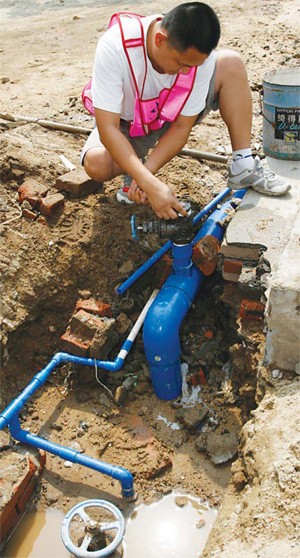Tapping into the future
Updated: 2011-05-27 11:12
By Lu Chang and Yao Jing (China Daily European Weekly)
Suez Environnement, one of the world's leading water firms, took in 1 billion euros last year in China, an increase of more than 10 percent year-on-year.
The French company, which now owns 32 joint ventures in China, aims to keep a double-digit growth this year in China and plans to invest about 1.3 billion euros to 1.4 billion euros in global projects.
"China has always been an important part of our global business strategy as water shortage is becoming a major issue in the country," says Jean-Louis Chaussade, chief executive officer of the group.
China, which represents 21 percent of the world's population, has access to only 7 percent of the world's water resources. The water shortage in China is likely to worsen due to the growing population in the bigger cities, Chaussade says.
According to the latest census, 50 percent of the Chinese population in 2010 was urban, compared with 35.7 percent 10 years ago.
Chaussade estimates cities and large towns will contain two-thirds of the total population in the near future.
"At that time there will be more need for clean water, and water management is going to be a key issue in China if the government wants to keep the economic growth," Chaussade says.
Sino-French Water Development, a venture between Hong Kong's NWS Holdings and Suez, invested 250 million yuan to provide water services and waste water treatment services to an industrial park in Chongqing, a southwestern municipality in China.
Charles Chaumin, president and CEO of Suez Environnement Asia, is planning to invest in China over the long term.
"We will further boost our earnings by new projects and new contracts with local water companies," he says.
Other investors are also very optimistic. Veolia Water, another major foreign player in China, expects its business to grow five times in the next 10 years.
"We saw China as a very potential market," says Jorge Mora, CEO of Veolia Environmental Services. "The per capita water volume in China is very low, just one-quarter of the world average. But in Europe, we have needs of about 200 liters of water per person a day. You can imagine how big the market is if each person in China needs 200 liters of water.
"It's a great opportunity, but a challenge as well."
|
|
Veolia Water is one of the first foreign companies to invest in Beijing's sewage treatment sector after it successfully won a bid for a waste disposal project in the capital in 2007.
Years of investment have paid off. Tap water in Beijing, Shanghai and other major cities is much better than it was years ago. But with so many players piling into China's water market, industry watchers say fierce competition for water projects mean profit margins may be squeezed out.
"International water giants face rising competition for contacts from China's homegrown water treatment firms such as Beijing Capital Co and China Railway, many of which have evolved from water equipment suppliers or city construction contractors," says Zhao Li, the director of the Water Policy Research Center at the Chinese Academy of Social Sciences.
But rising water prices, particularly in major cities where it has doubled in the past four years, is the main reason that foreign companies are counting on significant future returns, he says.
Analysts say that tap water prices vary from 2 yuan per ton to 5 yuan per ton throughout China, and will continue to rise at a rate of 10 percent a year for the next 10 years.
China's water prices are still low by global standards, even with the average residential water fee in major cities now up 3 percent since the end of 2008, to 2.44 yuan per ton. Average water prices in Europe range from four to 10 times higher, according to Deutsche Bank.
"The government is spending billions of dollars to ensure drinking water supply and to divert water from the flood-prone south to the dry north," Zhao says. "I think the changes reflect a growing official consensus that low prices are part of China's water shortage problem, since they give companies and households little incentive to save the water.
"But price increases are not everything," he says. "The market should also look to improve efficiency and infrastructure that cause problems such as leakage."
E-paper

Pearl paradise
Dreams of a 'crazy' man turned out to be a real pearler for city
Literary beacon
Venice of china
Up to the mark
Specials

Power of profit
Western companies can learn from management practices of firms in emerging economies

Foreign-friendly skies
About a year ago, 48-year-old Roy Weinberg gave up his job with US Airways, moved to Shanghai and became a captain for China's Spring Airlines.

Plows, tough guys and real men
在这个时代,怎样才"够男人"? On the character "Man"

